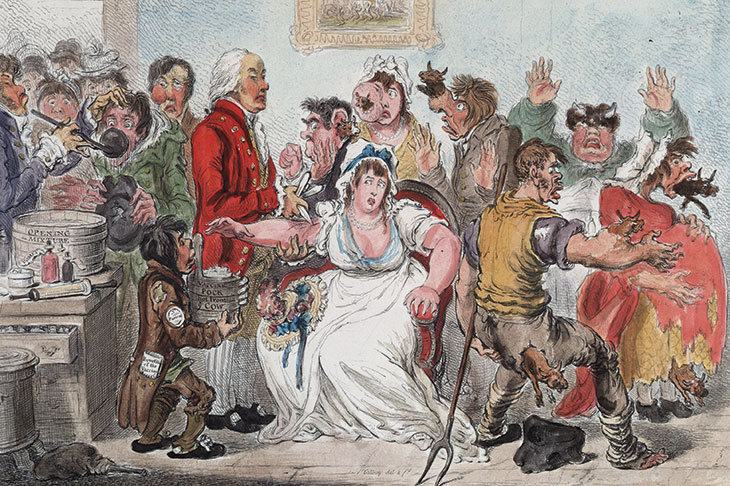In supposedly unprecedented times such as ours, there are compelling reasons to turn to the history of medicine. For hope, that epidemics do indeed come to an end; for consolation, that the people of the past suffered even more than us; and for insight into how we could be doing better. The story of smallpox satisfies all three.
Imagine an airborne disease such as Covid-19, but one in four people who get it will die. It causes a fever, but also a rash which cloaks the body in disfiguring pustules that fuse into reptilian scales. It leaves its victims, if not dead, scarred or blind. Few agree about why this disease spreads, how the body defends itself, or which treatments work. Nobody has heard of antibodies. Louis Pasteur’s immunological discoveries are more than a century away. Among the quackery of the 18th century, strange reports emerge about how to avoid contracting this devastating disease: transpose pus from the spots of the sick into the arms of the healthy, provoking a milder illness, while giving protection against full-blown smallpox.
Lady Mary Wortley Montagu was quick to inoculate her son, having narrowly survived smallpox herself
In fact, prophylaxis against smallpox had been practised for centuries in China and India before it moved west. Lady Mary Wortley Montagu, a fashionable force in Britain’s highest society, observed Greek women inoculating the arms of children when she visited Constantinople in 1717. She was quick to inoculate her son, having narrowly survived smallpox herself two years previously, with the scars to prove it. This aristocratic approval encouraged local British practitioners to offer the service for a healthy profit. However, the church and medical establishment maintained their opposition, believing it to be unnatural and unproven. In the following decades, the popularity of inoculation spiked every few years when fear about smallpox outbreaks was greatest.
In 1796, Edward Jenner, a Gloucestershire doctor, discovered that cowpox (caused by vaccinia virus), a relatively mild illness passed from cattle to farm labourers, also conferred protection against smallpox (variola virus). Using the well-known technique of inoculation, Jenner successfully transposed pus from the spots of a cowpox-infected milkmaid to a nine-year-old boy. When this child did not then react to inoculation using variola, Jenner declared the experiment a success. He realised vaccinia was a ‘beneficent malady’, which could, through vaccination, bring the scourge of mankind to an end.
Adding a new angle to this history, Gavin Weightman’s The Great Inoculator tells the forgotten story of Daniel Sutton, a lowly surgeon from Essex who became an inoculation entrepreneur. Sutton’s was ‘a rustic kind of revolution’ and not so much scientific as pragmatic. In the 1760s he streamlined inoculation into a commercial enterprise by making the necessary incisions smaller, and encouraging recipients not to stay indoors for several weeks afterwards, as had been standard.
Weightman’s central claim — that ‘without Sutton, vaccination would not have come about’ — is not wholly convincing, in part because inoculation was practised widely in Scotland and Ireland, becoming common from the 1750s, without Sutton’s influence. However, the book’s wider point is persuasive: Sutton’s work on inoculation established a degree of logistical feasibility, social networking, intellectual debate and public approval that enabled vaccination after 1796 to be seen ‘not as something entirely new’.
Michael Bennett’s War on Smallpox tells the story of what happened next. This impressive culmination of 15 years of research minutely details the international spread not of variola virus, but of its containment. Bennett’s history of vaccination spans from Jenner’s discovery to the end of the Napoleonic wars, and accounts for the differences in local uptake of the procedure across France, Germany, Russia, India, the Americas and finally China, where the vaccine ‘completed its encirclement of the globe’. As a live biological product, vaccinia virus did not travel well. It proved simpler to use pus from the cowpox sores of recently vaccinated people to continue the supply. But the public’s wavering prejudice against vaccination meant that maintaining this ‘arm-to-arm’ approach was a challenge.
Both Weightman and Bennett agree that medical breakthroughs do not rest on scientific research alone. How the elites and the ‘industrious poor’ received these medical inventions mattered, particularly because inoculating children was, and continues to be, an ‘emotion-laden rite of passage’. After 1800, Britain became the heartland of scepticism against its own invention, and ‘pockets of anti-vaccination sentiment were often inflamed rather than soothed by medical hectoring or government pressure’. The more dangerous practice of variolation continued until it was finally outlawed in Britain in 1840.
The revolution was slow. It took until 1980 for the WHO to announce that smallpox was over, two centuries after a vaccine was invented. It was the first and only disease ever to have been eradicated. The world now waits for another vaccine. News outlets portray this search as a race between competing laboratories. Yet as the history of smallpox shows, if collaboration, efficient distribution, equitable access and the fostering of public trust are mere afterthoughts to the science, the vaccine will fail. We can only hope that history repeats itself with a Jennerian discovery in the months ahead, but it will be just the beginning of the work required to keep us safe.






Comments